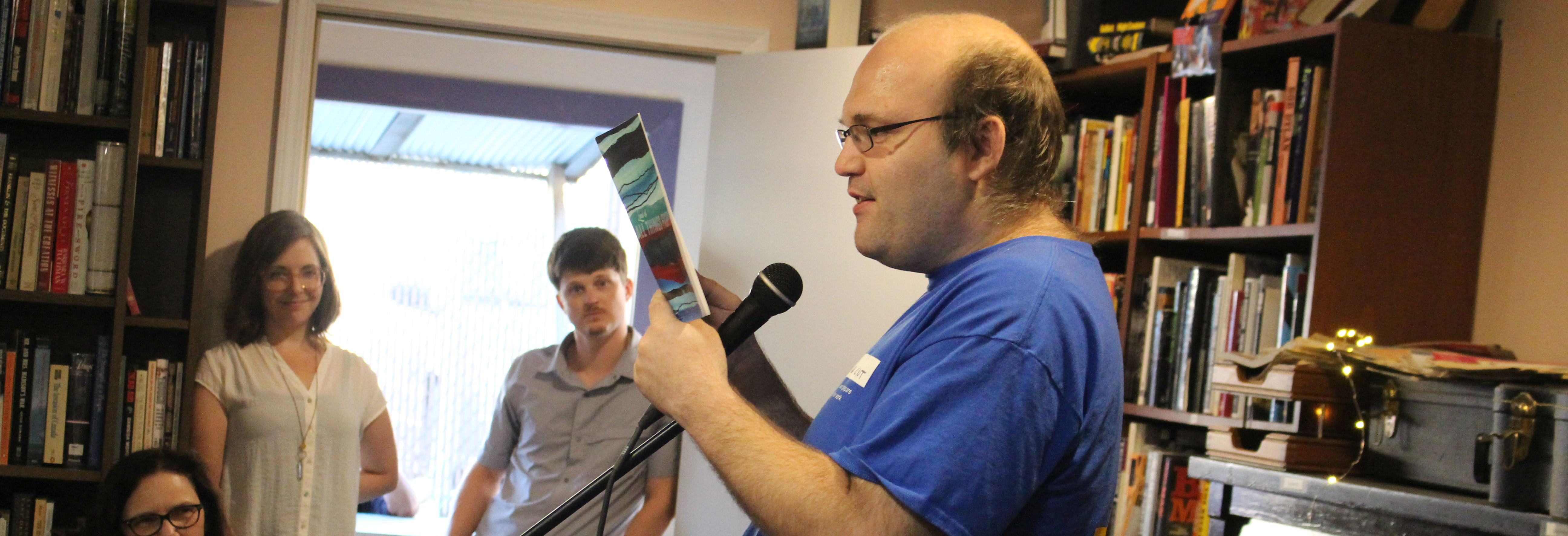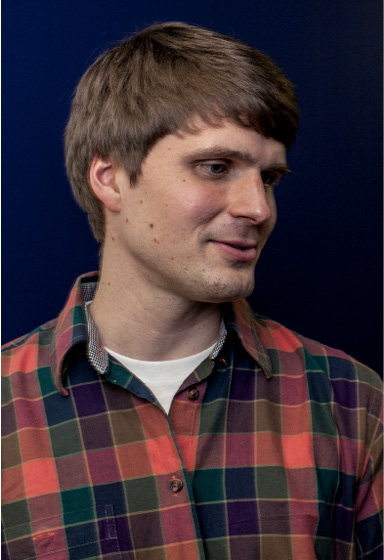Bryan Boyce was a middle schooler when he spent a typical summer with his brother and his friends in a cabin in Minnesota. They would spend whole days swimming out in the lake, waging squirt gun wars against each other, and walking downtown to buy Little Debbie snacks. However, this time of childhood bliss was interrupted one day when a girl quietly pulled Boyce aside and conspiratorially whispered, “Hey, do you realize we are the only normal people here?”
As the sibling of a brother with developmental disabilities, Boyce knows firsthand the value and richness of exchange across neurological difference. He aspires to create a supportive community where people genuinely understand that developmental disabilities bring different kinds of value as well as various new perspectives in looking at our world. What would it take, he asks, to build a world where kids and families sought out and actively relished disability as a rich form of human difference that they can learn and gain from, like any other form of diversity?
“True inclusion takes changing mindsets,” Boyce argues. He believes that most of our thinking is still firmly rooted in old ways of conceiving of disabilities. If we think of disabilities just as a deficit or something to be pitied, we will only see a small part of the bigger picture. He created Cow Tipping Press, a non-profit organization currently located in Minneapolis, to provide opportunities to relish assets rather than pity deficits through the unique lens of creative writing. By teaching inclusive writing classes for adults with developmental disabilities, Boyce believes they gain the “radical chance to speak for themselves in a medium usually used to speak about them.”
Cow Tipping Press has created waves of meaningful impact for the disabled communities throughout Minnesota. The Press has recently expanded its creative writing program with the help of VSA Minnesota and Disability Minnesota. Faculty at several colleges, including Carleton, Macalester, St. Olaf, and the Universities of Minnesota, and of Massachusetts at Amherst, have frequently invited Cow Tipping authors into their classrooms to facilitate workshops on inclusion, empathy, and divergent thinking.
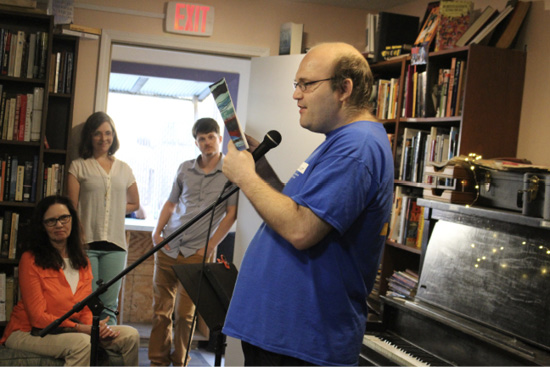
Cow Tipping author and speaker Vince Fiorilli
Your Mind
Some minds are dark
But minds can be bright
I just heard a tone that makes you glad
But what does it do
makes you happy and open your mind to do
something fun
oh my, oh my, oh my
let’s open our mind and have fun
Author statement for Vince Fiorilli: Vince had many dreams in his life. He even had so many dreams he didn’t know where to start. After a while, all that was left was writing. And man, does he get compliments on what he writes and his imagination!
Vince Fiorilli, one of the Cow Tipping authors that Boyce works with, can affirm the benefits of the organization’s philosophy’s inclusivity: “When I was a kid, I thought I would never fit in the world. I always read some books and sometimes all I was doing for the day was reading some mystery books and sometimes even some poetry books. So after a while since I was reading them so much I grew up with a skill—as I like to call it, the great power in words. I can write poems that catch people’s attention and some short stories that can make people smile. Now I’m even trying to make some books of my own and sell them at maybe an art fair. Heck, one of the biggest surprises is how I found how good I am at it. Another surprise is what words do to me. I could be in the angriest mood whatsoever, and by either reading or brainstorming, a poem can calm me down. Well that’s just the beginning.”
As much as possible, Boyce says, he tries to let his authors’ words speak for them. They have a lot to say. “After two years of running Cow Tipping Press, I can still enter a Day-training and Habilitation (DTH) facility, group home, or special ed classroom and marvel at the creativity, diversity, quirks, frustrations, and ingenuity of the one in 50 peers with developmental disabilities we all were born alongside. That so few of us know and see these traits on a daily basis is a choice we have made about how to set up our society: its mindsets, structures, policies, funding. I hope these pieces beg the question: what other assets are we leaving on the table when we don’t choose to change it?”

Cow Tipping Author Jasmine
Gratitude to Plants
It’s like the plants need rain and sun, then they’ll grow. Feeding the plants after it gets some sun, it’ll grow. Then it will grow. When the fall comes the leaves will turn and it’ll all fall out. In the winter they die off, then the plants are all dead. The plants they would stay alive, they wouldn’t die out and plants never grow lilacs like the purple. Only the trees, bushes. And I know trees grow leaves. Small leaves and big leaves. And dandelions come from—they used to remind me, ‘cause they’re like yellow, remind me of butter. Dandelions, dandelions, what’s in them? Why they’re yellow? Sunflower, sunflower.
Author statement for Bruce Zentic: Bruce is from Minneapolis. He likes old cars and phonographs, stereos, and radios. He likes writing about certain stuff that grows, like lilacs. He likes dandelions like butter. He still likes his cucumber pickles. He likes lights and “go” signs. He likes riding a bike.
Birdy
I was out fishing and I caught a couple fish, then I said to myself one more cast. I then cast the line and within seconds I got a tug on it. I started to wheel in and on the end of the line is a bird. I was like, a bird who thinks he is a fish. I then take a picture of me and the bird on the line then take the hook out of its beak. I then place it on the boat and it doesn’t fly away. It just sits there looking at me.
Then I take it to my car and drive away back home. I then get a tank from my basement and fill it with water. I place the bird inside it. It swims around and occasionally comes up for air. Then goes back down into the water and swims. I have never seen a bird who loved to swim as much as he did. It was a very unusual sight to see.
Then I go to record and post a video of the Bird-Fish. It gets over a million views on YouTube and over 200,000 likes and shares. I am now famous with a bird-fish. Who would have thought a bird would think it’s a fish and do what that bird does? Not me in a million years.
Author statement for Danny Roherty: Danny didn’t like to read and write. Harry Potter, however, changed that. He wrote his first poem and it was called “Life,” an anti-suicidal poem. So then it just blossomed from there. He started his book-writing and reading biographies and sci-fi or fantasy books and even wrote more poems. He thinks you all will love what he has to offer the world because he still has the imagination of a kid. One who wants to share his creativeness, to spread his imagination to the world.
My Mother is Mom
Family my mother can help me can different background in the south in she in south go to church in Mississippi Abdeen Abdeen MS. She pick the cotton in the field until the sun go down in the south in Mississippi in Abdeen.
Author statement for April Robinson: April was born in Harlem, NY on 54th Street. She likes greens and cornbread. April used to roller skate and also likes to play frisbee. Football. Go walking in her free time when it’s nice out. When she’s bored she loves to make jewelry, draw pictures and write about all sorts of distant characters, in a fictional sense, and also loves to write about happy things. Someday April wants to open her own chiropractor business, give people massages, and have a big house where all of her friends can come and stay with her.
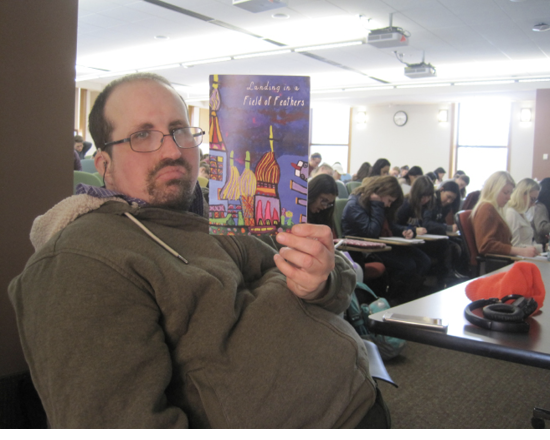
Cow Tipping author and speaker Thomas Robinson at the University of Minnesota
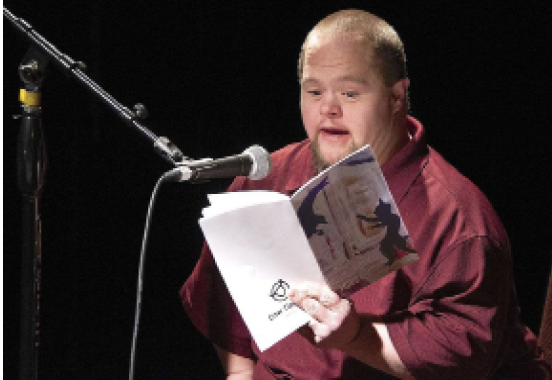
Cow Tipping author and teaching apprentice Nathan Bauer reading one of his poems
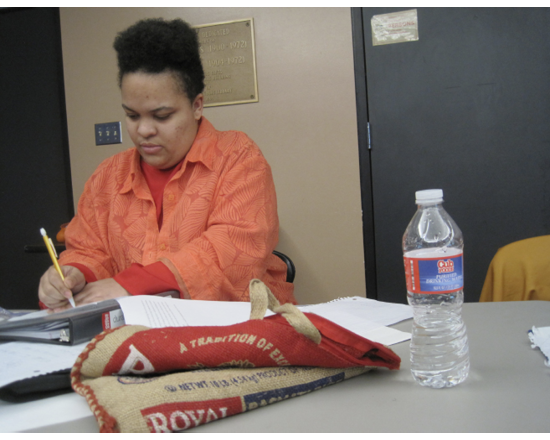
Cow Tipping author and teaching apprentice Mary Ayetey
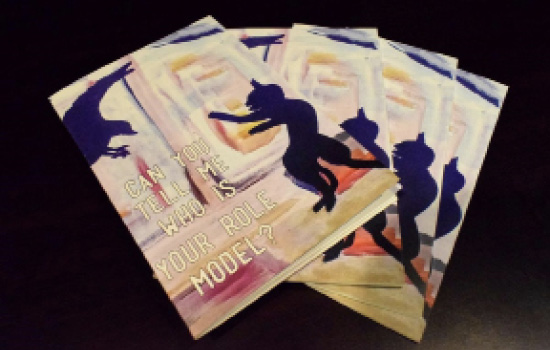
One of Cow Tipping Press’s publications

